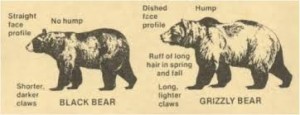March 20, 2014

Staying Safe in Bear Country
Bears take advantage of whatever food is available in their home range. They are attracted by sights, sounds, memories, and particularly smells. Bears can smell garbage from a mile away and if they are rewarded with an easy meal they learn very quickly to repeat behaviors. Wild bears normally have a fear of people. If they are allowed to forage for food near us, they can quickly become habituated to our presence and become bolder in their actions. Soon enough, whether it is a black bear or a grizzly, someone will feel threatened. Once a bear learns to forage near people, it is usually too late to discourage the bear.
Avoiding Bear Problems!
A person’s best defense against bears is to avoid them. Preventing the attraction of bears through proper food storage, garbage disposal and camp maintenance is the most economical and effective way to reduce bear problems. However, bears are sometimes attracted to clean and well-maintained camps.
animal carcass, and perhaps a bear. The area should be avoided. Birds or squirrels alarm
calls might be telling you that a bear is near.
If You Encounter a Bear
Posted in: Spotlight on Safety